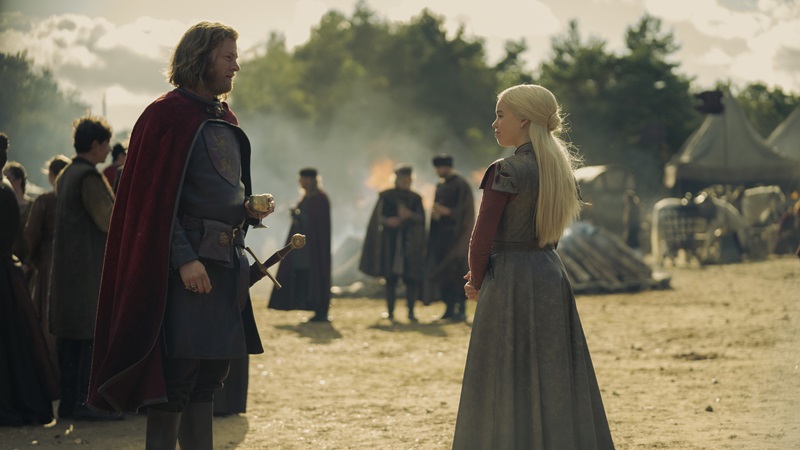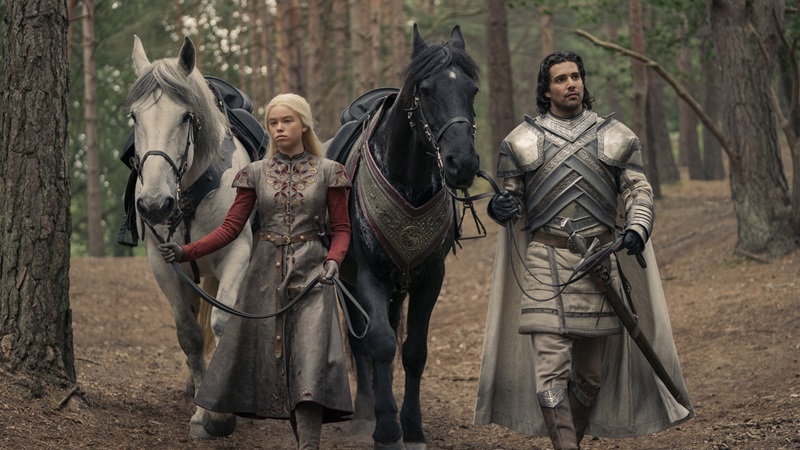In the latest episode of ‘House of the Dragon’, viewers were taken on a journey through the King’s quest for validation, which strikingly mirrors the show’s own struggle to find its footing in the highly competitive world of television.
As the King faced challenges and obstacles in his pursuit of recognition and respect from his subjects, the show itself grappled with similar hurdles in trying to establish itself as a worthy successor to its predecessor, ‘Game of Thrones’. Both the King and the show faced doubts and skepticism from those around them, with many questioning their ability to rise to the occasion and prove themselves.
However, just as the King remained steadfast in his quest for validation, ‘House of the Dragon’ continues to push forward, determined to carve out its own place in the hearts of viewers. The parallels between the King’s journey and the show’s struggles serve as a poignant reminder of the universal desire for acceptance and recognition, and the resilience needed to overcome challenges and emerge victorious. With each episode, ‘House of the Dragon’ continues to prove that it is a force to be reckoned with, capable of captivating audiences and earning its rightful place among the greats of television.

The King’s Hunt: Exploring the theme of validation in «House of the Dragon» Episode 3
In the third episode of «House of the Dragon,» titled «The King’s Hunt,» the theme of validation is explored through the actions of the characters. As the King’s Hunt commences, the members of the royal family are seen seeking validation from one another and from the court.
Prince Daemon Targaryen, in particular, is portrayed as a character who is constantly seeking validation for his skills as a dragonrider and warrior. His reckless behavior during the hunt is driven by his desire to prove himself to his father, King Viserys. Similarly, Princess Rhaenyra is shown seeking validation from her father and the court as she navigates the complexities of being the King’s chosen heir.
The hunt itself becomes a symbol of validation, with the participants striving to prove their worth and skill in the eyes of the king and the court. However, as the hunt progresses, it becomes clear that validation is a fleeting and fragile thing, easily lost in the chaotic world of Westeros. Through the characters’ struggles for validation, «House of the Dragon» highlights the importance of self-acceptance and inner strength in a world where external validation can be elusive and fleeting.
Behind the scenes: Creative solutions that emphasize the themes of the series «House of the Dragon»
«House of the Dragon» is a series that delves into the complex and intriguing world of power struggles, politics, and betrayal within the Targaryen dynasty. Behind the scenes, the creative team has worked tirelessly to emphasize the themes of the series through innovative solutions.
From the stunning set designs to the intricate costumes and makeup, every detail has been carefully crafted to transport viewers into the fantastical world of Westeros. The team has also gone above and beyond to create unique and immersive storytelling techniques, such as using CGI to bring the dragons to life in a way that feels both realistic and magical. Additionally, the music and sound design play a crucial role in setting the tone and enhancing the emotional impact of each scene.
The creative solutions implemented behind the scenes of «House of the Dragon» not only bring the story to life but also help to underscore the themes of power, ambition, and the complexities of human nature that are central to the series. By pushing the boundaries of visual and narrative storytelling, the team has successfully captured the essence of George R.R. Martin’s world and brought it to life in a way that is both captivating and immersive for viewers.

Audience reactions: How viewer perception reflects the Dragon House’s commitment to validation
Audience reactions to the Dragon House’s performances provide valuable insight into the extent of the dance crew’s commitment to validation. Through the lens of viewer perception, it becomes evident that the Dragon House is dedicated to pushing the boundaries of creativity and self-expression. The awe and admiration elicited from audience members indicate that the crew’s performances resonate deeply with viewers, inspiring feelings of empowerment and liberation.
This validation from the audience serves as a testament to the Dragon House’s ability to connect with spectators on a profound emotional level, sparking a sense of community and shared experience. The raw, unfiltered energy of the dancers captivates audiences and leaves them in a state of wonderment, demonstrating the crew’s unwavering dedication to their craft. By evoking such powerful reactions from viewers, the Dragon House solidifies its reputation as a pioneering force in the world of dance, constantly pushing the boundaries of what is possible and redefining the art form.
The genuine connection forged between the crew and their audience is a testament to the Dragon House’s relentless pursuit of validation through artistic excellence and authenticity. As spectators leave the theater, their minds buzzing with the energy and passion of the performance, it is clear that the Dragon House’s commitment to validation is unwavering and undeniable.

The impact of validation on storytelling: Lessons from the third episode of «House of the Dragon»
Validation plays a crucial role in storytelling, as it can shape the way characters perceive themselves and the world around them. In the third episode of «House of the Dragon,» we see how validation impacts the characters’ decisions and actions.
For example, when Rhaenyra Targaryen receives validation from her father, King Viserys, she feels empowered and confident in her abilities as a dragonrider and heir to the throne. This validation fuels her ambition and drives her to assert her claim to the throne, despite facing opposition from her half-brother, Aegon. On the other hand, Aegon’s lack of validation from his father leaves him feeling insecure and unsure of his place in the family.
This insecurity drives him to seek validation from others, leading him to make decisions that ultimately put him at odds with his family. The impact of validation on storytelling is clear in this episode, as it not only influences the characters’ actions but also adds depth to their relationships and motivations. Overall, «House of the Dragon» demonstrates how validation can shape the narrative and drive the characters’ arcs in compelling and unpredictable ways.
